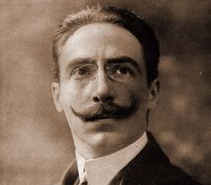Ah, there go the house lights, which means that our conductor, ET-tore PanIZ-za, is on his way into the pit Such was the refrain heard many a Saturday afternoon from 1934 to 1942 from the Metropolitan Opera’s beloved radio host Milton Cross.Héctor Panizza (1875 – 1967) was born in Buenos Aires. His parents were Italian. His father was a cellist as well as a composer and it was he who gave his son his first music lessons. Ettore travelled from Argentina to Italy to enter the Milan Conservatory, where he studied piano, composition, harmony and counterpoint, receiving the Conservatory’s first prize for composition upon graduating.
Panizza‘s own operas reflected the verismo style of composition. He enjoyed early acclaim when his opera Medio evo latino was performed in Buenos Aires during the 1901 season conducted by Arturo Toscanini; and two more of his operas, Aurora and Besanzo, were successfully mounted in Buenos Aires.
Nevertheless he realized that a better living was waiting in a conductor’s career. Engagements came quickly including Covent Garden, Paris, Vienna, and in his home city of Buenos Aires the Teatro Colón. Likewise, his conducting at La Scala, beginning in 1916, drew the attention of Toscanini, who later appointed him his assistant in Milan for the decade beginning in 1921. From 1922 to 1924, Panizza was a member of the Chicago Opera Company. In 1934, he succeeded Tullio Serafin as principal conductor of the Metropolitan Opera‘s Italian wing. He stayed for eight seasons, leading 231 performances of 26 operas.
In 1932 Richard Strauss wrote to him, ‘I continue to recall the magnificent Elektra which you directed in Milan with such finesse and élan, fulfilling all my wildest dreams. I hear that they intend to put on Elektra this summer in Buenos Aires, and you mentioned that you most probably will be the musical director of the Colón Theatre. In that event, I shall have only one desire: that you direct my Elektra also in Buenos Aires; I cannot think of a better interpreter…’
Panizza’s conducting style was highly dynamic and extraordinarily vigorous. For instance in the famous performance from 1935 of Verdi‘s La traviata he can be heard quite clearly shouting ‘Attacca!’ to the orchestra after the end of the Prelude to Act I, and immediately launching into a most hectic and dramatic, as well as highly appropriate, tempo.
He published his autobiography Medio Siglo de Vida Musical in 1952. Panizza died in Milan in 1967.
